
Aggregate
metrics 2024
Empowering researchers with accessible findings.
Introduction
Aggregate, published by WILEY, is a premier open-access journal established in 2020, dedicated to advancing the fields of Chemistry, Materials Chemistry, Materials Science, and Molecular Biology. Based in the United States, this rapidly rising journal (Q1 in various categories as of 2023) has quickly made its mark as a valuable resource, evidenced by its impressive Scopus rankings—ranking #6 in Chemistry (miscellaneous) and #13 in Materials Science (miscellaneous) among others—place it firmly in the top percentiles of these disciplines. With an emphasis on rigorous peer-reviewed research, Aggregate provides an essential platform for researchers to disseminate groundbreaking findings and innovative methodologies that propel the scientific community forward. As an open-access journal, it ensures that cutting-edge research is accessible to a global audience, thereby enriching the dialogue among professionals, researchers, and students alike. Explore the latest advancements and contribute to the vibrant discourse in these critical areas of science by publishing with Aggregate.
Metrics 2024
 -
- 13.90
13.90 14.90
14.90 -
-Metrics History
Rank 2024
IF (Web Of Science)
JCI (Web Of Science)
Quartile History
Similar Journals
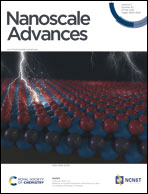
Nanoscale Advances
Transforming Ideas into Nanoscale Innovations.Nanoscale Advances, published by the Royal Society of Chemistry, stands out as a leading open-access journal dedicated to advancing the field of nanoscience and nanotechnology since its inception in 2018. With a specialized focus on areas such as atomic and molecular physics, bioengineering, chemistry, and materials science, this journal has consistently achieved top-tier rankings across several categories, reflecting its high-impact contribution to research and innovation. Currently classified in the Q1 quartile for both Atomic and Molecular Physics and Chemistry (Miscellaneous), and Q2 for Bioengineering, its prestige is underscored by impressive Scopus rankings, including a notable 34th position in General Engineering. With its commitment to disseminating high-quality research, Nanoscale Advances serves as an invaluable resource for researchers, professionals, and students alike, fostering collaboration and scholarly exchange in the rapidly evolving landscape of nanotechnology.
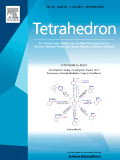
TETRAHEDRON
Elevating scientific dialogue with rigorous peer-reviewed research.TETRAHEDRON, published by Pergamon-Elsevier Science Ltd, is a leading peer-reviewed journal that has been pivotal in advancing the fields of Biochemistry, Drug Discovery, and Organic Chemistry since its inception in 1957. With an ISSN of 0040-4020 and an E-ISSN of 1464-5416, this journal provides a platform for the dissemination of cutting-edge research and innovative methodologies that contribute significantly to the scientific community. Recognized for its rigorous editorial standards, TETRAHEDRON has been categorized in the Q3 quartile for 2023 across its relevant fields, reflecting its solid impact within the scientific sphere. Despite the current absence of Open Access options, the journal continues to engage a diverse readership, offering invaluable insights and advancements that fuel both academic and industrial applications. With an ongoing commitment to excellence, TETRAHEDRON remains an essential resource for researchers, professionals, and students aiming to stay at the forefront of chemistry and biochemistry research.

ChemistrySelect
Unveiling the Future of Chemical DiscoveriesWelcome to ChemistrySelect, a pivotal journal in the field of chemistry published by WILEY-V C H VERLAG GMBH. With its ISSN 2365-6549, this journal aims to provide a comprehensive platform for researchers and practitioners to share significant advancements in various areas of chemistry, contributing to the ongoing dialogue and development within the scientific community. Since its inception in 2016, ChemistrySelect has focused on publishing high-quality research that spans multiple facets of the discipline, earning its place in the Q3 category for Chemistry (miscellaneous) as of 2023. While operating under a subscription model, the journal remains committed to broadening accessibility and engaging a wide audience of researchers, professionals, and students. The journal's objective is to facilitate the dissemination of groundbreaking findings through rigorous peer review, ensuring that the latest studies reflect the evolving nature of chemistry research. As we approach 2024, ChemistrySelect continues to be an invaluable resource for the academic community, positioning itself as a trusted voice in the world of chemical research.

CHINESE JOURNAL OF ORGANIC CHEMISTRY
Exploring the Frontiers of Organic CompoundsThe Chinese Journal of Organic Chemistry, published by Science Press, serves as a pivotal platform for advancing the field of organic chemistry since its inception in 1996. With an ISSN of 0253-2786, this esteemed journal provides robust scientific contributions, reflecting significant advancements and novel findings that are crucial to the organic chemistry community. As of 2023, it is categorized in the Q3 quartile of organic chemistry journals, positioning it within the competitive landscape of this vibrant research area, ranking #147 out of 211 in Scopus, corresponding to a 30th percentile ranking. The journal is committed to fostering a scholarly exchange of ideas and research, making it an essential resource for researchers, professionals, and students dedicated to exploring the complexities and applications of organic compounds. The Chinese Journal of Organic Chemistry continues to support the dissemination of high-quality research that contributes to both local and global scientific endeavors.
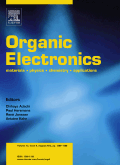
ORGANIC ELECTRONICS
Leading the Charge in Interdisciplinary ResearchORGANIC ELECTRONICS, published by Elsevier, is a premier journal dedicated to the rapidly evolving field of organic electronics, encompassing a spectrum of interdisciplinary research from materials chemistry to electrical engineering. As a crucial resource for researchers, professionals, and students, the journal boasts significant impact, currently ranked in the Q2 category across multiple fields, including Condensed Matter Physics, Materials Chemistry, and Electrical and Electronic Engineering. With a commitment to advancing knowledge and innovation from its base in the Netherlands since its inception in 2000, ORGANIC ELECTRONICS not only provides critical insights into organic materials and their applications but also fosters collaboration among scientists through its comprehensive findings and high-quality articles. The journal does not currently offer open access but provides various access options for subscribers. With its HIndex signaling substantial academic output and engagement, ORGANIC ELECTRONICS remains an essential platform for groundbreaking research that is shaping the future of technology.

JOURNAL OF MOLECULAR MODELING
Exploring the Depths of Computational ChemistryJOURNAL OF MOLECULAR MODELING, published by Springer, is a pivotal resource for researchers and professionals in the fields of chemistry, computer science, and molecular sciences. The journal's ISSN is 1610-2940, with an E-ISSN of 0948-5023, reflecting its commitment to disseminating cutting-edge research from 1996 to 2024. Although the journal does not operate under an Open Access model, it remains an invaluable platform for the publication of innovative studies related to computational methods, theoretical chemistry, and molecular simulations. With a notable categorization across multiple quartiles—including Q4 in Catalysis and Q3 in Computational Theory and Mathematics—the journal holds a distinct rank in Scopus, highlighting its influence and contribution to the discipline. The importance of this journal lies in its ability to bridge the gap between theoretical understanding and practical applications, making it essential reading for students and scholars seeking to advance their knowledge and research in molecular modeling.
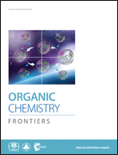
Organic Chemistry Frontiers
Championing open access for transformative organic chemistry insights.Welcome to Organic Chemistry Frontiers, a premier academic journal published by the Royal Society of Chemistry, dedicated to advancing the field of organic chemistry. With an impressive Q1 ranking in the 2023 category of Organic Chemistry and a notable Scopus rank of 34 out of 211, this journal provides a vital platform for researchers and professionals to disseminate innovative research, cutting-edge methodologies, and comprehensive reviews. Serving as an open-access journal, Organic Chemistry Frontiers aims to enhance the visibility and accessibility of critical research findings in the organic chemistry domain, fostering collaboration and dialogue among scientists worldwide. Since its inception in 2014, it has consistently published high-quality articles that contribute to the progression of knowledge and application in organic chemistry, establishing itself as a cornerstone for students and scholars striving to deepen their understanding and drive forward their research endeavors.
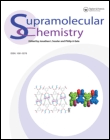
SUPRAMOLECULAR CHEMISTRY
Advancing Research Beyond Traditional ChemistrySupramolecular Chemistry, published by Taylor & Francis Ltd, is a pivotal journal in the field of chemistry, showcasing innovative research that transcends traditional molecular boundaries. With an ISSN of 1061-0278 and E-ISSN of 1029-0478, this journal has been a central resource for scholars since its inception in 1992 and is set to continue its impactful contributions through 2024. Ranked in the third quartile (Q3) of miscellaneous chemistry categories and holding a commendable place at #194 out of 408 in the general chemistry rankings according to Scopus, the journal provides a platform for the dissemination of groundbreaking studies that explore the interactions and behavioral patterns of supramolecular systems. Although it does not currently offer open access, its rich content is accessed by a wide audience, fueling advancement and collaboration among researchers, professionals, and students interested in the intricate world of supramolecular science. By regularly publishing peer-reviewed articles, this journal is crucial for anyone seeking to deepen their understanding of complex chemical systems and their applications across diverse fields.

Macroheterocycles
Driving Forward the Future of Organic ChemistryMacroheterocycles is a premier academic journal dedicated to the exploration and advancement of Analytical Chemistry and Organic Chemistry, published by the esteemed Ivanovo State University of Chemical Technology. Since its inception in 2008, this open-access journal has focused on providing a platform for innovative research and breakthrough discoveries in the field of heterocyclic compounds. With its current ranking in the Q3 quartile for Analytical Chemistry and Q4 quartile for Organic Chemistry, Macroheterocycles is rapidly establishing itself as a valuable resource for scientists, researchers, and students seeking to enrich their understanding of complex chemical structures and analytical techniques. Its comprehensive publication model ensures that the latest findings are accessible to a global audience, fostering collaboration and discourse in the scientific community. With ongoing contributions aimed at addressing contemporary challenges in chemistry, this journal is poised to make significant impacts in the field while encouraging the dissemination of knowledge within and beyond Russia.

ACS Organic & Inorganic Au
Empowering Global Knowledge Exchange in ChemistryACS Organic & Inorganic Au, published by the American Chemical Society, stands as a premier open-access journal dedicated to advancing the fields of organic and inorganic chemistry. Since its inception in 2021, this journal has swiftly risen to prominence, achieving a commendable Q1 classification in Inorganic Chemistry, Organic Chemistry, and Physical and Theoretical Chemistry as of 2023. With an ISSN of 2694-247X, it provides a vital platform for researchers, professionals, and students to disseminate their findings and engage with cutting-edge work across converged disciplines. Operating from its headquarters in Washington, DC, ACS Organic & Inorganic Au is committed to fostering a collaborative research environment, encouraging rigorous peer review, and ensuring the wide accessibility of high-quality scholarly articles. With its open-access model, readers worldwide can freely access and utilize research findings, promoting a global exchange of knowledge crucial for driving innovation in chemistry.